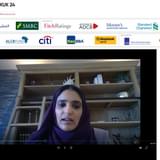The Jordanian government issued JOD34mn (US$47.9mn) in local currency ijara sukuk last week, which carry a tenor of 5 years and a profit rate of 3.01%. The issuance was assisted by the Islamic Corporation for the Development of the Private Sector (ICD), and the proceeds will be used to fund government spending.
The transaction was more than 3x oversubscribed according to the country’s Minister of Finance. The government also noted that the issuance would help develop Jordan’s Islamic banking sector, as it will allow it to manage excess liquidity – estimated at JOD1.4bn.
Despite this excess liquidity in the country’s main Sharia-compliant lenders, Jordan’s Islamic financing industry remains nascent compared to that of the wider Middle East.
“The development of the Islamic finance sector in Jordan has not kicked off as it has elsewhere in the Middle East largely because demand for Islamic products across the country is not particularly large compared to elsewhere across the region,” said Mansur Mannan, director at Tejara Capital.
As a result, the government has been slow in driving the market’s development.
“The same happened in Oman, where before the government developed a domestic sukuk market, and local Islamic investors and lenders put money elsewhere – such as in Abu Dhabi and Dubai – where Sharia-compliant products existed,” Mannan noted.
But it is not only Jordanian Islamic banks that are well capitalised. A Dubai-based banker who worked on a number of deals in Jordan said the country’s banking sector as a whole remained highly liquid.
Although dollars are available in the domestic markets and across the Middle East, dinars are available at preferential rates at a local level. This explains why, alongside a government initiative, Jordanian credit remains relatively scarce on the international markets.
“The sovereign has been relatively quiet on the international markets because of a new government approach that aims to reach out to the local markets. The government is choosing to tap the domestic markets – it is largely a political rather than a financial decision,” said Osama Alsayeh, financial analyst at the Central Bank of Jordan.
The country’s corporates also rarely tap the international markets. This is because of tax reasons according to the Dubai-based banker. Corporates prefer to borrow locally because there is usually a 25% tax premium on external borrowing.
Nevertheless, Mannan noted that there is likely to be increased corporate sukuk issuance going forward, following the government’s recent transaction.
Alsayeh agreed, adding that it was likely the majority of any corporate financing would, similarly to the sovereign, be conducted internally. The banker confirmed that they were in talks with a number of Jordanian entities looking to raise capital.
Despite a preference for local financing, Jordanian corporates have not been entirely absent from the international markets. Royal Jordanian Airlines (RJ), which tapped the international markets for a 5-year US$275mn dual Islamic and conventional facility in December last year, and Hikma Pharmaceuticals, which raised US$500mn in a 5-year bond in April 2015, are two notable exceptions.
RJ’s facility was upsized by US$25mn from US$250mn because of high demand. Alsayeh said there is significant demand for Jordanian credit, particularly from the US – largely as a result of the fact that such credit remains relatively strong compared to its Middle Eastern peers.
The banker added that further interest in Jordanian paper from across the Middle East stems from the fact that there are a number of Jordanian bankers in the GCC who are familiar with the country and its credit.
However, it is unlikely there will be many other Jordanian corporates accessing the international markets; most Jordanian entities still prefer the local loan markets – particularly bilateral loans, according to the banker, leaving the capital markets to those entities with either the market clout or government backing to execute their deals.









